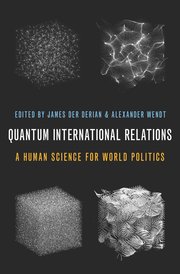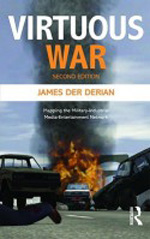Quantum international relations
a human science for world politics
- ISBN: 9780197568217
- Editorial: Oxford University Press
- Fecha de la edición: 2022
- Lugar de la edición: Oxford. Reino Unido
- Encuadernación: Rústica
- Medidas: 24 cm
- Nº Pág.: 408
- Idiomas: Inglés

The contributors to this volume are motivated by a common apprehension and a common hope. The apprehension was first voiced by Einstein, who lamented the inability of humanity, at the individual and social level, to keep up with the increased speed of technological change brought about by the quantum revolution. As quantum science and technology fast forward into the 21st century, the social sciences remain stuck in classical, 19th century ways of thinking. Can such a mechanistic model of the mind and society possibly help us manage the fully realized technological potential of the quantum? That's where the hope appears: that perhaps quantum is not just a physical science, but a human science too. In Quantum International Relations, James Der Derian and Alexander Wendt gather rising scholars and leading experts to make the case for quantum approaches to world politics. As a fundamental theory of reality and enabler of new technologies, quantum now touches everything, with the potential to revolutionize how we conduct diplomacy, wage war, and make wealth. Contributors present the core principles of quantum mechanics-entanglement, uncertainty, superposition, and the wave function-as significant catalysts and superior heuristics for an accelerating quantum future. Facing a reality which no longer corresponds to an outdated Newtonian worldview of states as billiard balls, individuals as rational actors or power as objective interest, Der Derian and Wendt issue an urgent call for a new human science of quantum International Relations. At the centenary of the first quantum thought experiment in the 1920s, this book offers a diversity of explorations, speculations and approaches for understanding geopolitics in the 21st century.
Introduction
1. 'Quantum Theory: The Case for a New Human Science of International Relations'
James Der Derian (University of Sydney, Australia) and Alexander Wendt (Ohio State University, USA)
Part 1. History and Theory
2. 'First Encounters: Quantum Mechanics and the Human Sciences'
Nicholas T. Harrington (University of Sydney, Australia)
3. 'Mind, Matter, and Motion: A Genealogy of Quantum Entanglement and Estrangement'
Jayson C. Waters (University of Sydney, Australia)
4. 'A Quantum Temperament For Life: A Dialogue Between Philosophy and Physics'
Jairus Victor Grove (University of Hawaii, USA)
5. 'A Conceptual Introduction to Quantum Theory'
Michael Schnabel (University of Chicago, USA)
Part 2. Science and Technology
6. 'The Quantum Moonshot'
Shohini Ghose (Wilfrid Laurier University, Canada)
7. 'Climate Politics and Social Change: What can cognitive and quantum approaches offer?'
Manjana Milkoreit and Karen O'Brien (University of Oslo, Norway)
8. 'These are not the droids you're looking for: Offense, Defense, and the Social Context of Quantum Cryptology'
Jon R. Lindsay (University of Toronto, Canada)
9. 'Quantum Technology Hype and National Security'
Frank L. Smith III (Naval War College, USA)
Part 3. Quantizing IR
10. 'Quantum Pedagogy: Teaching Copenhagen and Discovering Affinities with Dialectical Thinking in IR'
Thomas Biersteker (Graduate Institute of Geneva, Switzerland)
11. 'The Problématique of Quantization in Social Theory: A Category-Theoretic Way
Forward'
Badredine Arfi (University of Florida, USA)
12. 'On Quantum Social Theory and Critical International Relations'
Michael P.A. Murphy (University of Ottawa, Canada)
13. 'Quantum Sovereignty + Entanglement'
Mark Salter (University of Ottawa, Canada)
14. 'Quantum and systems theory in world society: Not brothers and sisters but
relatives still?'
Mathias Albert and Felix M. Bathon (Universität Bielefeld, Germany)
15. 'The Value of Value: A Quantum Approach to Economics, Security and
International Relations'
David Orrell (Systems Forecasting, Canada)
Part 4. Bringing the Human Back into Science
16. 'Introspection Redux: Incorporating Consciousness into Social Research'
Leonardo Orlando (SciencesPo, France)
17. 'To "See" is to Break an Entanglement: Quantum Measurement, Trauma and
Security'
K.M. Fierke and Nicola Mackay
18. 'The Moral Failure of the Quest for Certainty'
Laura Zanotti (Virginia Tech University, USA)







